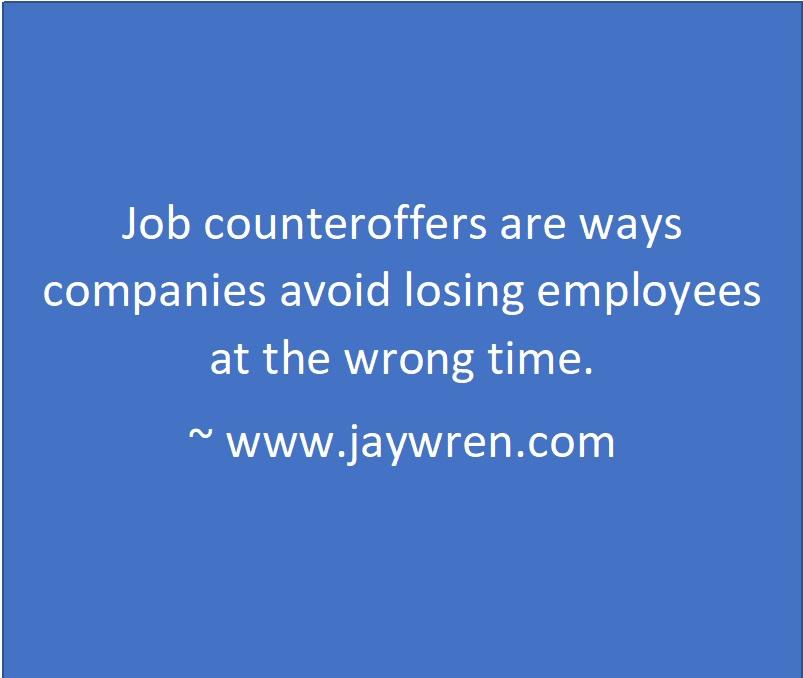Counter Offers: The Stress of Trying to Leave a Company
There is some interesting history on this article. The first day that I posted it, I copied it from a database template, and pasted the article into this website. The content of that template somehow brought down the entire the website. I could still see the back-end of the website but site visitors could only see a blank page.
When I published the article from the template, the article went out in feeds on Twitter, Facebook, LinkedIn, and Feedburner, The title was “People are stranger than horses.”
I restored the website, rewrote the article in a text file, and published then it. However, with an article titled “People are stranger than horses” already published, my rewrite seemed to need a new title that reflected the earlier article.
I was really having a challenge with this article. I was experiencing a bit of stress in getting a very simple article published.
The relationship between the title and counter offers is that people may exhibit very strange behavior under the stress of making a job change, just as my website surprised me in crashing the way it did and was causing me a bit of stress.
People who accept counter-offers often find tried that they have gone running back to the problems they had been trying to leave behind. Having made two job changes myself, I have experienced firsthand the pressure that a job change can cause.
IF PEOPLE ARE STRANGER THAN HORSES
What brought up the subject of people and horses and now computers pertains to experiences I have had as recruiter. I have read that three of the most stressful things in life are the birth of your children, buying a house, and making a career move. I can think of other things perhaps equally stressful, and births, marriages, and career moves for some people are not stressful at all. They are part of the miracles of living.
In a letter of congratulations that I send to applicants who have recently signed a letter for an offer of employment, I tell them that the purpose of my letter is to help them prepare emotionally as well as understand what to expect in terms of a counter-offer.
A company prefers to lose people based on the company’s timing. This concept is easy enough to understand if you follow sports. Some of the more mediocre players are very valuable in the middle of the season. They are trained and they know the playbook. When the season ends, the mediocre players with no contracts for future work see their value drop to zero.
A counter-offer is simply a negotiation process. The employer tries to convince an employee to stay with anything from an increase in pay or responsibility or convenience or nothing but praise. The employee can engage in the negotiation or just sit there and listen with a deaf ear.
One of the toughest people I have ever known served as an Army ranger in Vietnam. He and I worked at the same company for over three years. He was a father of four and felt that he needed to make more money. He sought and landed a job that gave him a pay increase.
When he resigned, he went through a counter-offer process with some people who were skillful sales people and could be skillfully intimidating. The former ranger felt that the people who were making the counter-offer had betrayed him earlier in his career at the same company. He sat with the people making the counter-offer for over an hour. He politely listened to what the management team had to say and asked questions for more details. He dragged out the process like a prizefighter drawing out a fight just to punish another boxer. Finally, one of the managers making the counter-offer said, “So you have decided to stay with our company?”
This Army ranger stood up and said, “Yes, I have, but I need to make more money for the sake of my family. He took out a pen, pulled a piece of paper from across the desk of the manager directly in front of him, and wrote down a number. Then he turned the paper for the manager to see and pushed it back across the desk. The number was twice his current salary. He looked at each of the two people he viewed as Judases and then said, “Call me when you can move my salary to match that number.” He then walked out. No one called him.
As it turns out, this post has taken a different direction from the one that brought down my website. I was certainly not going to copy and paste it from the same deadly document I have used before. Since I noticed that the post was already out there on the Internet before I had finished it, I felt compelled to complete rewriting the post tonight.
However, tonight I could not focus on the strangeness of horses and computers relative to people. This post discusses different life experiences from those in the deadly post. Yet I plan to tell those other stories, soon I hope. The experiences in that story were experiences that today are valuable to me. On this night, I am just wondering about that Army ranger, who must be nearing retirement now. I liked the guy. He was a friend, but other people were put off by the guy, and put off when I tell how he handled that counter-offer. They see him as arrogant. I don’t know. Maybe he was arrogant. To me, he was a war survivor, a tough person in business, a friend, and a person who was not bewildered in the flow of life changes.

Comments are closed.